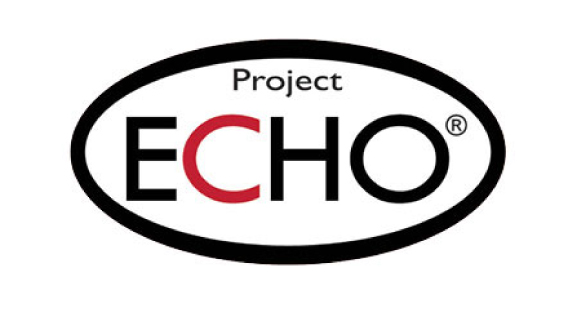
Project ECHO
Connect with experts across the country to improve your practice.
Project ECHO (Extension for Community Healthcare Outcomes) is a movement to demonopolize knowledge and amplify capacity to provide best practice care. The Wayside Women Services (WWS) Project ECHO focuses on sharing practice and support service information which will enable participating organizations to empower women and families to break the cycle of addiction and trauma.
Wayside is the “hub” for several ECHO learning communities originating in Minnesota and open to all (via Zoom online meetings).
+ Maternal & Infant Health ECHO
This ECHO series focuses on maternal and infant health disparities — with support from the Minnesota Department of Human Services (DHS). Please visit our dedicated maternal health series page for more information: waysiderecovery.org/maternalhealth
Neurobiology of Substance Use Disorders
May 16, 2024 | 12:00 – 1:00PM CT
facilitated by Dr. Mark Thomas, Ph.D., Professor of Neuroscience and Director of the University of Minnesota’s Medical Discovery Team on Addiction.
Summary:
This ECHO session will describe studies that examine how addictive drugs modify the brain to produce the pathological behaviors that characterize substance use disorders. While neurobiological studies have unearthed a wealth of very specific information about the biochemical and behavioral consequences of drug exposure, there is a considerable gap in our knowledge about what connects the actions of molecules to enduring changes in behavior. Using cellular electrophysiology and rodent behavioral models, a progressive pattern of opioid-induced synaptic plasticity in reward circuits has been identified. This ECHO session will describe this pattern and discuss efforts to determine which aspects of the plasticity are deleterious and which may be restorative to reward system function.
Learning Outcomes:
– Participants will learn about experimental methods used to study synaptic plasticity in the mammalian CNS induced by experience.
– Participants will learn about the progressive pattern of plasticity induced by chronic opioid exposure.
– Participants will learn about how aspects of neuronal plasticity in the nucleus accumbens—a key node in the reward circuit—are associated with increased reinforcing properties of psychoactive drugs like opioids.
Biography:
Dr. Mark Thomas, Ph.D. is a Professor of Neuroscience and Director of the University of Minnesota’s Medical Discovery Team on Addiction, a research team of 60 faculty funded by the state legislature to fuel cross-disciplinary collaborative research to discover new effective biology-based treatments for substance use disorders.
Dr. Thomas received his Ph.D. in Neuroscience from UCLA in 1998 and completed postdoctoral training in Psychiatry at Stanford and Psychology at the University of Michigan before joining the faculty at the University of Minnesota in 2003. His research examines how addictive drugs alter the brain and how these brain changes can lead to compulsive drug use. His lab is now focusing on ways to disrupt addiction relapse. Dr. Thomas will discuss the team’s recent data and the opportunities that exist for this work to maximize support for those seeking long-term recovery.
Please contact Zora Darcourt at zora.darcourt@waysiderc.org with any questions, concerns, or ECHO session ideas.
+ WOMEN SERVICES ECHO
The Wayside Women Services ECHO focuses on sharing best practices between providers to empower women in recovering their sobriety, identity, home, family and community.
The series focuses on LADC, LPC, LPCC, RN, LPN, LICSW, LSW, LMFT and MAT providers, along with those who provide support to women with substance use disorder.
Our Women Services ECHO series is approved to offer 1 CE credit by the MN Boards of Social Work, Behavioral Health and Marriage and Family Therapy. It also meets criteria for additional licensed health provider individual study options.
Sessions take place on third Thursday of each month from 12:00 – 1:00 pm CST.
Past topics:
- Advanced Practice: Increasing LGBQT+ Cultural Competencies
- How and Why We Address Family Relationships as Part of Recovery
- Trauma-Informed Supervision
Though often defined as a best practice and standard of care, integrated treatment services for co-occurring substance use and mental health concerns remain inconsistently offered. When they are available, the type and delivery of services across systems of care can vary greatly. Such gaps lead behavioral health leaders and providers to seek methods to understand and implement evidence-based practices in their unique treatment setting. The Dual Diagnosis Capability in Addiction and Mental Health Treatment Indexes (DDCAT and DDCMHT) are valid and reliable tools to guide effective assessment of current programming, provide guidance on implementation efforts and monitor sustainability of integrated mental health and substance use care in substance use and mental health treatment programs.
This two-part session will provide attendees an overview of the Dual Diagnosis Capability Indexes; key elements used to assess a program’s capability and strategies for making changes to increase a program’s co-occurring capability.
+ Community resource hub
Since our inception in 1954, it has been in our DNA to build strong partnerships with community providers to better serve women, children and families. With the expansion of our Women Services and Maternal & Infant Health ECHO series, our ecosystem is now nationwide. Please visit Wayside’s Community Resource Hub to find services, resources and programming for maternal and substance use health and wellness.

SIGN UP
Fill out the form to receive email invitations to Wayside-hosted ECHO sessions.
